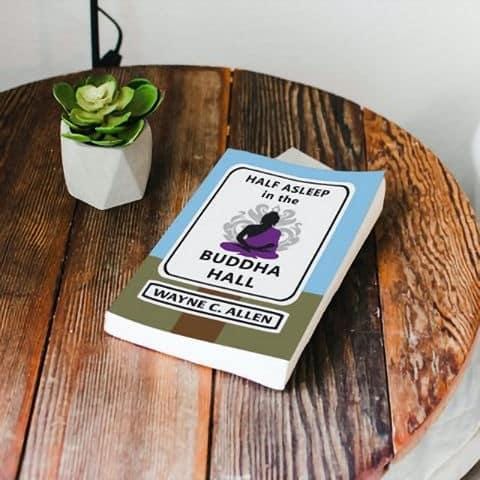As Within, so Without is a message of freedom. We have created the reality in front of us, and at any time can shift things in another direction. All that’s required is focussed action.

Looking for more on this topic?
Check out my book,
Half Asleep in the Buddha Hall.
My “Eastern” book takes you by the hand and helps you to find peace of mind.
Half Asleep in the Buddha Hall is a Zen-based guide to living life fully and deeply.
(Here’s a direct Amazon link)
Purchase digital versions (Apple, Nook, Kobo, etc.) from this page
Unresolved “mother” issues are common, but remember, so are the following, and more: Unresolved
- father issues,
- issues with dependent people,
- issues with demanding people,
- issues of sexual attraction,
- issues regarding touch and intimacy,
- communication issues.
And on and on.
The “cure” to unresolved issues is to let go of what is not working, and experiment with new approaches.
We resolve the issue directly in front of us. Not for all time (impossible!) but simply for this time.
“Back to “mommy issues.”
A reader wrote:
“I’ve been trying for years to break the cycle by changing my behaviour toward my mother. How do I get my mother to love me? I’ve changed everything she asked me to and she still doesn’t love me. She just demands more change.”

Such game playing is not limited to “moms.”
You can’t win someone’s love (or even their regard) by endlessly trying to do what they demand of you.
In the above scenario, the “mom” is heavily invested in proving her daughter either wrong or dysfunctional, or both.
If the daughter changes her behaviour to match the (latest) demand, “mom” will simply create another demand.
Some relationships are never going to work out. Some can be modified. But you will never get anywhere in life or relating if you endlessly attempt to change yourself according to the demands of others.
Here’s the game:
- They say, “If you love me you’ll do (whatever.)”
- You do whatever. What you have set up is, “Tell me what to do, wrap it in a threat to withhold love, and I’ll do whatever you tell me.”
- Likely, then, the next thing you’ll hear is, “If you really love me you’ll do this other thing (or behave in a certain way) and I’ll love you in return.”
And on and on.
In relating, you get what people choose to give you. Playing games changes nothing.
You have total choice regarding your response to what they give you, and total choice as regards who you choose to be.
This blog promotes embracing a life approach centered in your self. You become real through ceaseless reflection on, observation of, and dialog with yourself. From this reflection, you enact behaviours designed to match your inner reality.
It’s also about feeling your feelings, without judging them to be “good or bad” feelings.
Your self-dialog and your feelings are then shared with others through intimate conversation. The dialog is never about manipulating others into changing, nor is it about changing yourself into what others want you to be.
Look around you, at your life. You, and only you, made this.
You picked, you chose, and here you are, living this life. Further, your external reality is a precise reflection of who you are, on the inside. (The Buddhist version of this is: “All that you are is a result of what you have thought.”) As within, so without.
If you don’t like either your internal or external life (or both,) you start shifting what you can shift (hint: you can’t shift externals!) — your own behaviours, perceptions, ways of understanding.

Holding on to something (a failed idea, a dream of winning someone’s love, a restricted self view) causes you pain, and soon it becomes a physical block, a stuck pattern, and you are destined to feel pain and repeat the experience.
Becoming an adult is about finding yourself in your own context, and from there choosing how to relate both with others and with yourself.
Being who you are is never about obedience, doing it the way someone else wants you to. If people insist that you change to make them happy, resist, gently, and be yourself. If they can’t handle it, you’ll have to walk away.
Or, you’ll spend the rest of your life trying to be who someone else wants you to be.
Realizing this, and becoming self-responsible, takes wisdom. And wisdom is practice. Therefore, the wise person practices wisdom.
Wisdom is different from intelligence. I know many brilliant people whose personal lives are in the dumper, simply because they have not cultivated wisdom. The wise person believes and acts as if they have an endless list of available choices for the situations they confront.
It would never occur to a wise person to repeat a behaviour that didn’t get the results they wanted.
It’s like being caught in a building. One guy goes to the window, and searches for the crank. The wise person, seeing that the window is sealed, tries the door. The silly person stands at the window, saying over and over, “I’m sure if I look harder I’ll find the crank.”
Oftentimes people will complain that change takes a long time. They’ll try something, and get slightly better results and think, “At this rate I’ll be at this for the rest of my life.” They make a subconscious decision that, because change takes time, maybe they’ll just go back to doing things the old way.
The results of that way are not what they want — they may even be making themselves sick in the process, as their bodies break down from lousy choices, but the path to another way seems altogether too long, too hard.
So, they stop, and simply feel sorry for themselves. And get sicker. And eventually die. Seems sorta sad, eh?
I believe that we are on a path of incremental change. Who I am at the core of me is not changeable. What can change is how I choose to act, despite who I am at my core.
The beginning of change is often a small step into a new direction. Recognizing and celebrating this is far better than staying stuck in the familiar, non-functional known.





